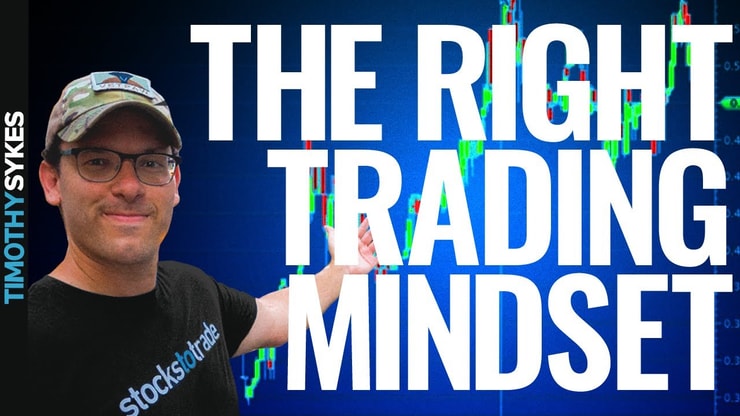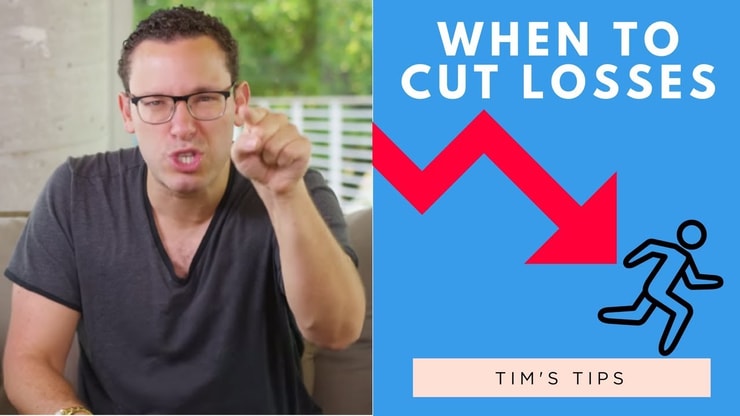I’m a big fan of small trading gains.
I know that might sound strange coming from someone who runs a trading education business.
Promoters even make fun of me for it…
I do enjoy promoters for mocking small gains of my https://t.co/fljCJN8USq students & I, they don't realize it’s the small gains that are TRULY best for small traders as they learn a the more they mock what’s right, the more valuable my teachings become, so I owe them thanks!
— Timothy Sykes (@timothysykes) February 24, 2021
I don’t care. I consider it my duty to be fully transparent as a trader (check out all of my trades posted publicly here) and to be completely honest about the trading industry.
It’s true that I’ve made millions. But it didn’t happen overnight. It took me 20+ years to build my account to where it is — over $6.9 million in profits as of late March 2021.* You can learn more about my story in my autobiography, “An American Hedge Fund.”
I’ve had some big wins over the years, but most of my profits are the result of small trading gains adding up over time.*
Most people don’t want to hear that … They want to know how to get rich quick.
Sorry, it doesn’t work that way. For traders who really want to be players in the penny stock game, this is a very important lesson…
(*Please note that my trading results are not typical. Most traders lose money. Individual results will vary. Trading is inherently risky. Before making any trades, remember to do your due diligence and never risk more than you can afford to lose.)
Table of Contents
Why Don’t People Talk About Small Trading Gains?

There’s a reason why most people don’t talk about small trading gains. They’re not sexy.
I’ll be 100% honest: posting about a $65 gain on Twitter probably won’t get as many likes as posting about a $65,000 gain.
Then again, who gets into trading for social media likes?
Unfortunately, plenty of people…
There were a lot of people who saw the GameStop Corp. (NYSE: GME) short squeeze, chugged a few energy drinks, and thought ‘I wanna make bank, bro!’ I wish them all the best in their trading … But I don’t want them as my students.
Following hot picks and chasing alerts doesn’t work in the long run.
This isn't about any "I told you so", I'm not in any BS shady chat where they prioritize "hot picks" instead of education, risk management & learning how to minimize losses when wrong…I just want newbies to be better prepared, hence why I link @30DayBoot & @completepenny daily
— Timothy Sykes (@timothysykes) March 4, 2021
I’d rather work with traders who are interested in…
- Learning about stock patterns
- Focusing on the trading process and how small trading gains add up
- Developing an intelligent trading strategy
If that’s you, you might be interested in my Trading Challenge. I make potential students apply — I don’t want students who just want to get rich fast. So I need to weed out lazy people.
Ready to get into the right mindset about trading?
What Are Small Trading Gains?
You’re probably wondering what small trading gains mean from a money standpoint.
First, let me be clear — there are no guarantees that any trader will make a profit.
But even if they do profit, it’s still not an easy question to answer.
Some traders might consider small trading gains to be in the $10 to $20 range. For other traders, small trading gains might be more in the $1,000 range.
The reason it’s hard to give a dollar amount is that every trader’s different. The amount will differ depending on account size, risk tolerance, and trading style.
Just to demonstrate that difference, consider the average gain of two of my up-and-coming students…
My student Kyle V., who I recently featured in a blog post, is currently up over $180,000 in profits. His average gain is about $140.*
Then there’s my student Matthew Monaco, who recently passed the million-dollar profit mark and is currently over $1.6 million in profits. His average gain is $1,341.*
As you can see, their average gains are relative to their account size. And in both cases, these are relatively small trading gains on a per-trade basis. But they add up over time!
(*Please note that Kyle V. and Matthew’s trading results are not typical. Most traders lose money. Individual results will vary. Trading is inherently risky. Before making any trades, remember to do your due diligence and never risk more than you can afford to lose.)
Why I Go For Singles, Not Home Runs
Here’s more proof that small trading gains add up…
I’ve made over $6.9 million in profits over the course of my career trading penny stocks.*
But it’s not like I’m making incredible $100,000 trades every single day.
Sure, I’ve had some standout trades. And I’m thankful for them when they come along.
But my average gain is $1,732.*
At writing, my profits have been the sum of over 6,500 trades — thousands of small trading gains, adding up over time.*
Part of why my gains are relatively small is because I trade scared…
Yes, I trade like a coward, not because I lack confidence in my rules, but because I have too much experience in this crazy niche so I won't allow any 1 play/pump to ruin my daily/weekly/monthly profit, I can be wrong on ANY stock, but trading scared makes me not scared to trade!
— Timothy Sykes (@timothysykes) June 25, 2020
For example, consider my recent trade on Exro Technologies Inc. (OTCQB: EXROF) on March 2, 2021.
I dip bought 5,000 shares of this recent winner at $2.28 after it crashed. My goal was to profit 5%–10%, but I was ready to get out fast if I was wrong. I sold soon after at $2.45 and made an $850 profit.*
I could have stayed in longer and made more. The next day it went up even higher…
But OTC stocks are sketchy and I’m very nervous about overnight holds right now.
In case you didn't see my TWO warning videos https://t.co/npBXBBdzvu & https://t.co/rxxDDuNcIP from Sunday & Monday warning how the SEC halts & recent-over-extension in OTC plays meant I didn't want to hold ANY of them overnight, promoters ripped them, but they were 100% DEAD ON!
— Timothy Sykes (@timothysykes) March 4, 2021
I didn’t need to get greedy. I was happy to have my small gain and move on!
The Investment Traders Should Really Make
I’m not an investor — I’m a trader.
There’s a difference. I’d never invest in the companies I trade. Most of them will eventually fail. I trade short-term fluctuations of low-priced penny stocks.
But there is something I believe is worth investing in…
Knowledge.
I always say that traders have two accounts: their monetary account and their knowledge account. Everyone wants to build their monetary account. But here’s the thing…
Nobody can control whether they’ll make money in the stock market. Most traders lose.
Even the few traders who do make money have no way of controlling how much money they will make.
But there are two important things you can control. The first is your mindset…
Get Out of the Money Mindset
Instead of focusing on getting rich, focus on getting smart.
I wish more traders would get out of the money mindset where they’re focused on getting rich. Instead, I’d love to see them devote time and energy to actually learning how the stock market works.
Recently, I wrote a post about Mariana, my student who just passed $1 million in profits.*
(*Please note that Mariana’s trading results are not typical. Most traders lose money. Individual results will vary. Trading is inherently risky. Before making any trades, remember to do your due diligence and never risk more than you can afford to lose.)
It wasn’t always easy for her … When she first started trading with a $15,000 account, she quickly lost $3,000.
She realized right away that she needed to adjust her mindset if she actually wanted to survive.
So she started studying DVDs like my “PennyStocking Framework” and top trader Tim Grittani’s DVD “Trading Tickers.” She followed the Trading Challenge chat room and devoted herself to learning how penny stocks work.
She also dialed back her positions big time. Sometimes she’d only take 100 shares in a stock. She wasn’t making much money … But it wasn’t about money. It was about building up muscle memory and experience.
It helped her develop a more conservative, smarter approach to trading. She began to improve. Mariana was able to scale up her positions as she became more confident in her strategy and better about cutting losses.
Now, she’s a millionaire.*
But you know what? As I write this, her average gain is $1,018. The sum of her profits is an impressive amount, but it grew as the result of many small trading gains.*
More Breaking News
- Credo Technology Unveils AI Innovation and Announces 3M Partnership
- Exponent Sees Promising Growth with Dividend Increase and Upbeat Q4 Earnings
- Datadog Sees Price Target Shifts Amid Market Changes
- QuantumScape Launches Eagle Line for Solid-State Battery Pilot Production
Cut Losses Quickly!
The first thing traders are in control of changing is their mindset.
The second one is cutting losses.
Cut losses quickly! It’s my #1 trading rule.
By cutting losses quickly, you can preserve as much of your money as possible and move on to the next trade. But if you hold and hope, there’s no telling how bad it can get.
I'm not here to rub losses into anyone, losses suck. But you DO have a choice on how to react to them, will you cut them quickly & minimize them like disciplined traders do? Or will you be like the 90% of stubborn traders who allow small mistakes to turn into potential disasters?
— Timothy Sykes (@timothysykes) March 4, 2021
For example, consider Rocket Companies Inc (NYSE: RKT) … People took the company’s name too literally when the stock spiked from the $20s to the $40s. They thought it had to keep going.
It didn’t. Now, a lot of people who hoped it would go higher are holding on to their shares and hoping for a bounce.
Maybe it will. Maybe it won’t. Who wants to deal with that kind of stress?
Dear holder & hopers, how's $CCIV $RKT $FUBO $CLOV treating you? Remember this lesson: PROMOTERS ARE NOT YOUR FRIENDS, THERE'S A REASON WHY THEY DON'T SHARE THEIR REAL NAMES/ALL TRADES PUBLICLY SO STOP TRUSTING $TWTR PUMPERS AND LEARN TO EXPECT THE WORST FROM EVERYONE! #StaySafe
— Timothy Sykes (@timothysykes) March 3, 2021
Instead of holding and hoping, smart traders figure out their maximum loss before the trade. When the stock reaches that point, they get out.
Why I Love Small Trading Gains…
If you ask me, three things have kept me in the trading game:
- Cutting losses quickly.
- A willingness to adapt.
- Many small trading gains added up over time.
It might make me the laughingstock of social media, but I’m not afraid to say it…
I love small trading gains!
People might make fun of me for my small trades or for exiting a stock too soon, but I don’t care. I’ve been doing this for 20+ years. So I’ve seen how bad things can get when you get greedy and go for home runs rather than singles.
Trading isn’t just about moving money around. It’s a mental game more than anything else. That’s why it requires so much practice and discipline. Are you interested in learning more about my strategy? Consider applying for my Trading Challenge.
Do you understand why small trading gains are so important? Leave a comment and say “I love small trading gains!”






Leave a reply